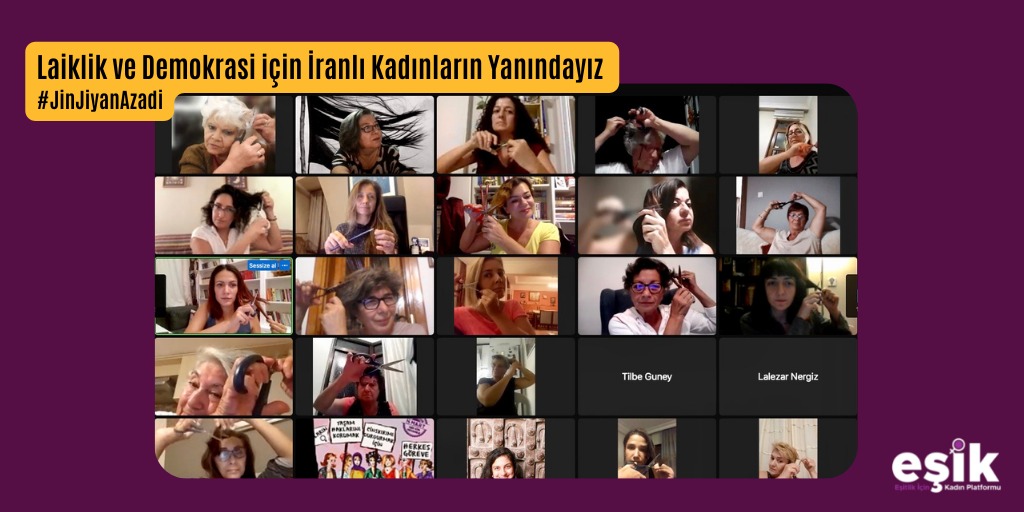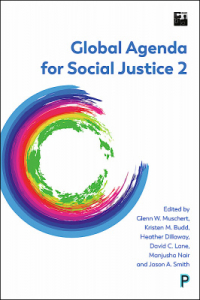On 13 September, Iran’s ‘morality police’ arrested and reportedly beat 22-year-old Kurdish woman Mahsa Amini for ‘improper hijab wearing’, apparently causing her subsequent coma and death in the hospital three days later. The police deny responsibility, claiming instead that she had pre-existing health conditions and died of a heart attack. According to her family, the young woman had no health issues.
Notwithstanding President Reisi’s assurances that there will be an investigation into her death, it is not far-fetched to say that the Islamic Republic of Iran killed Mahsa Amini, and continues to kill women (and men) protesting her murder. Every day, it threatens to kill women (and LGBT individuals) for being themselves. Despite government repression and internet shutdowns, this is what the people in Iran have been chanting in their protests on the streets of cities all over Iran, and not just in Tehran, and through their messages via social media: “Women, Life, Freedom”, “We don’t want an Islamic Republic”, “Justice, Liberty, No to Forced Hijab” and “Women are oppressed from Kurdistan to Tehran”.
One could add: Women are oppressed from Iran to Israel to Saudi Arabia to Turkey and to the United States.

Women from different cities at the Women’s Platform for Equality, Turkey’s virtual meeting on September 21, 2022. Platform activists shouted “Women, Life, Freedom” in Turkish and Kurdish as they cut their hair to show solidarity with women in Iran.
The motley crew of Iran’s geostrategic rivals must be pleased that the theocratic regime’s gross violations of Iranian women’s most fundamental human rights are getting the bad press that they deserve. Nevertheless, these same countries also grossly violate women’s human rights.
Israel, considered a ‘flawed democracy’ by the Economist’s Global Democracy Index, is built on violations of Palestinians’ basic human rights, and continues these on a daily basis. Despite its efforts to ‘pinkwash’ its occupation of Palestinian lands by marketing itself as a democracy and regional safe haven for women’s and LGBTQI+ civil rights, Israel militarises life in the occupied territories and inflicts violence that kills adults and children, limits women’s (and men’s) mobility, confines Palestinians to prisons or homes, and inflicts ill health and general deprivation.
Saudi Arabia’s crown prince Muhammad Bin Salman runs a PR campaign fashioning himself a reformer with a ‘progressive’ position on women’s issues, but the kingdom imposes mandatory hijab wearing, restricts women’s mobility and subjects them to flogging and executions for violations of deeply discriminatory laws based on male scholars’ interpretation of Islam. Discrimination and violence against women, and particularly against migrant women workers, is a well-known fact of life in Saudi Arabia. (At the same time, in theocratically run countries such as Iran and Saudi Arabia, women have some basic rights such as education – a right denied to girls under Afghanistan’s Taliban in 2022 – and working women in these and many Muslim-majority countries have socioeconomic rights such as paid maternity leave.)
Turkey, an authoritarian regime ruled by Recep Tayyip Erdoğan, witnesses at least three femicides and the same number of suspicious deaths of women, every day. While it is impossible to list the government’s many human rights violations, it is important to mention that the erosion of secularism and the open defiance of equality between men and women have hit women and girls particularly hard. Erdoğan’s unlawful withdrawal from the Council of Europe’s Convention on preventing and combatting violence against women and domestic violence, known as the Istanbul Convention, has been the most striking example of how little regard Turkey’s rulers have for women, the primary victims and survivors of gender-based violence.
Erdoğan based his unlawful withdrawal from the Istanbul Convention (unanimously ratified in 2011 by Turkey’s parliament) on the claim that it was ‘hijacked by a group of people attempting to normalise homosexuality – which is incompatible with Türkiye’s social and family values’. Authoritarian leaders and movements in Hungary and Poland make similar arguments against the Convention, curtailing women’s human rights in the name of ‘protecting the family’. (I wrote a piece in this space on women’s ongoing resistance to the withdrawal decision in the Istanbul Convention case). Turkey is no Iran. Nevertheless, it is the fact that the vital principles of gender equality and secularism have been so eroded in Turkey in the past 20 years – and with deadly consequences – that women in cities all over Turkey show such persistent solidarity with Iranian women.
Moving westward, the backlash against women’s and LGBTQI+’s hard-won rights, including the most fundamental one – to live free from violence – is alive and well in Europe.
Giorgia Meloni’s Brothers of Italy party, following its electoral victory on September 25, is expected to form the first far-right government in Italy since the Second World War. Meloni campaigned on the slogan ‘God, homeland and family’. Almost immediately, protestors took to the streets, fearing further restrictions on abortion (which is legal up to 12 weeks) and LGBTQI+ rights. There is little doubt that Meloni will adopt pronatalist policies and limit abortion in practice when she takes office, and that her policies are animated by sexism, racism and xenophobia.
Exalting motherhood and ‘traditional’ families, decrying ‘gender ideology’, and attacking LGBTQI+ ‘lobbies’, reactionary political movements do not openly say they are against the principle of equality, but their eagerness to talk about ‘complementarity’ (as opposed to equality) between men and women is telling. From Italy to Poland to Turkey, women have reason to worry that arguments involving ‘God’, ‘homeland’ and ‘family’ can result in policies that undermine their basic rights. Just look at Iran…
In the United States, the #MeToo movement exposed the prevalence of sexual harassment and rape. Despite constitutional protections for civil rights, police violence against the black community, and black women in particular, culminated in the Black Lives Matter and Say Her Name movements. In addition to the generally high prevalence of violence against women, non-native/non-tribal men’s abuse of indigenous and immigrant women,, due to loopholes in enforcement and risk of deportation respectively, lead to impunity for perpetrators. Most importantly, women’s rights to bodily autonomy, and their right to choose whether and when to give birth, are severely curtailed in nearly half of the 50 states. At least 14 states have total bans on abortion, most making no exceptions for rape or incest.
As I discuss in more detail in ‘From the streets to social policy: How to end gender-based violence against women’, published in Global Agenda for Social Justice 2, violence against women (VAW) is a universally prevalent problem, even in countries where women’s legal rights are safeguarded. VAW is a violation of human rights and a form of discrimination against women. ‘It includes all acts of gender-based violence that result in, or are likely to result in, physical, sexual, psychological or economic harm or suffering to women, including threats of such acts, coercion or arbitrary deprivation of liberty, whether occurring in public or in private life.’
Patriarchy, which subjects women and girls to violence because of their sex, is the root cause of violence against women and gender-based violence. As the 1993 Declaration on the Elimination of Violence Against Women (DEVAW) put it, VAW ‘is a manifestation of historically unequal power relations between men and women, which have led to domination over and discrimination against women by men and to the prevention of the full advancement of women, … [VAW] is one of the crucial social mechanisms by which women are forced into a subordinate position compared with men’.
Feminist resistance to patriarchy in different countries around the world demonstrates that women do not buy that subordinate position no matter in which ‘religious’ package or flavour of ‘tradition’ it is sold. Regardless of whether they call themselves feminists, most women understand that VAW affects them regardless of their class, race/ethnicity, religion/religiosity, sexuality or nationality.
If we mean to eliminate violence against women, we need to listen to women’s voices, understand the research evidence produced by scholars, and implement concrete policy solutions such as the Istanbul Convention that are the product of decades of struggle.
Özlem Altıok is a Principal Lecturer holding a joint appointment with Women’s and Gender Studies and International Studies at the University of North Texas.
She is the author of the chapter ‘From the Streets to Social Policy: How to end gender-based violence against women’ in the Global Agenda for Social Justice 2.
 Global Agenda for Social Justice 2 edited by Glenn W. Muschert, Kristen M. Budd, Heather Dillaway, David C. Lane, Manjusha Nair and Jason A. Smith is available on the Bristol University Press website. Order here for £14.99. The chapter ‘From the Streets to Social Policy: How to end gender-based violence against women’ is available to buy on Bristol University Press Digital.
Global Agenda for Social Justice 2 edited by Glenn W. Muschert, Kristen M. Budd, Heather Dillaway, David C. Lane, Manjusha Nair and Jason A. Smith is available on the Bristol University Press website. Order here for £14.99. The chapter ‘From the Streets to Social Policy: How to end gender-based violence against women’ is available to buy on Bristol University Press Digital.
Follow Transforming Society so we can let you know when new articles publish.
The views and opinions expressed on this blog site are solely those of the original blog post authors and other contributors. These views and opinions do not necessarily represent those of the Policy Press and/or any/all contributors to this site.
Image credit: Artin Bakhan on Unsplash


